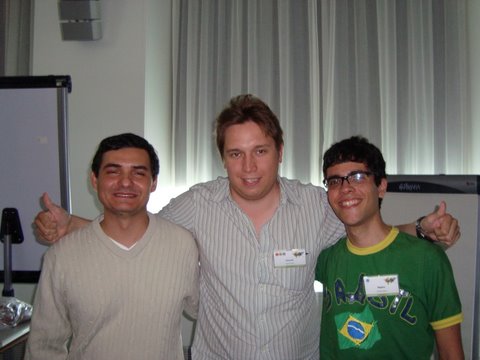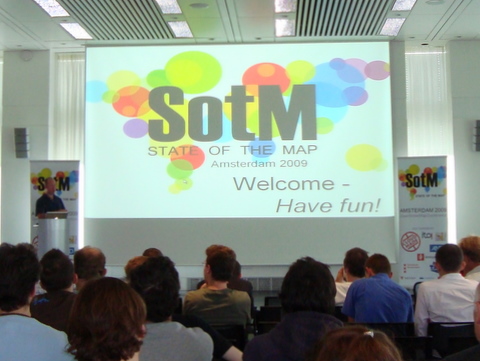Já faz uma semana que aconteceu o congresso e até agora não tinha consiguido continuar o relato aqui. Vou listar rapidamente alguns destaques do que aconteceu de legal nos três dias.
Na minha opinião e de muita gente presente, o projeto mais legal apresentado esse ano foi o Walking Papers (video da apresentação em http://www.vimeo.com/5593879). Se trata de uma ideia ingênua e funcional - Vc imprime, pelo site deles um mapa com marcas especiais nas bordas do papel, faz anotações diversas, por exemplo numeração e nome das ruas, restrições de tráfego, etc e quando o papel for scanneado e colocado de volta no site, todas as suas anotações vão aparecer dentro do Potlatch no local correto.
Foi muito legal ver tambem uma demonstração de uma empresa de consultoria local chamada Geodan com o Microsoft Surface utilizando os mapas do projeto (filminho demo: http://www.youtube.com/watch?v=h5YxM0w4Jos). Não existe forma mais intuitiva e divertida de navegar em mapas. A maquininha que eles instalaram na entrada do auditório estava sempre cheia de gente brincando com a novidade.
Houve um foco grande esse ano no aspecto qualidade dos dados do OSM. Qualidade comparada com provedores comerciais de dados e ideias que estão sendo implementadas em vários lugares (os alemães são campeões nesse departamento) para verificar e aprimorar sistematicamente a qualidade dos dados.
E é claro, os 14 convidados do projeto de bolsa vindos do mundo inteiro de Colômbia a Vietnã, passando por Egito, Geórgia, Africal do Sul entre outros, deram um "sabor especial" ao evento. As palestras dos bolsistas foram muito assistidas e comentadas - é incrível que algum resultado ainda possa ser produzido em países como Cuba, onde os cidadãos não tem permissão para usar aparelhos GPS!
Em particular, a palestra Brasileira, apresentada por mim e pelo Arlindo foi bem aplaudida. Nos cortaram um pouco do tempo prometido - tivemos que nos virar com "míseros" oito minutos, mas deu pra passar uma mensagem legal. Eu sinceramente, "tremí nas bases" - falar pela primeira vez pra uma audiência daquele tamanho e em inglês não foi fácil, mas sorte que o Arlindo começou pela parte dele com propriedade e conseguimos destacar o que está acontecendo (e o que precisa acontecer) no Brasil.
Foi, sem dúvida uma experiência única. Encontrar praticamente todos os grandes colaboradores do projeto ao vivo teve um efeito peculiar. Ao se identificar com os ideais e estilo deles a gente passa a ver que dar grandes contribuições é possível para nós também, pois no fundo, somos muito parecidos.



Discussion
Comment from Longbow4u on 18 July 2009 at 18:45
Yahoo Babelfish translation and some adjustments, hope it comes as close as possible to the original:
"Already one week has passed since the congress and so far I could not continue the story here. I go to list quickly some of the most important and interesting points of what happened in the three days. In my opinion and in that of much of the people present, the most interesting project presented this year was the Walking Papers (video of the presentation in http://www.vimeo.com/5593879). It deals with an ingenuous and functional idea - e.g. you can print a map of a certain place with marks in the edges of the paper, make diverse notations, for example numeration (of houses) and name of the streets, restrictions of traffic, etc and when the paper will be scanned, all its notations go to appear inside of the Potlatch in the correct place.
For me it was very interesting to also see a demonstration of a local consulting company called Geodan with Microsoft Surface using the maps of the project (demon: http://www.youtube.com/watch?v=h5YxM0w4Jos). There is no more intuitive and entertaining method to navigate in maps. The machine they had installed in the entrance of the audience was always full of people playing with this novelty. The conference had a great focus this year in the aspect of the quality of the data of OSM. The quality comparison with commercial suppliers of data and ideas that are being implemented systematically in some places (the Germans are champions in this department) to verify and to improve the quality of the data.
And especially the 14 guests of the stipend program that had come from the entire world, from Colombia to Vietnam, and from Egypt, Geórgia, South Africa, among others, had given a " special flavor" to the event. The lectures of the scholarship holders had been very well attended and commented - it is incredible that some results still can be produced in countries like Cuba, where the citizens do not have permission to use GPS devices! In particular, the Brazilian lecture, presented by me and by Arlindo was well applauded. They had cut of a little of the promised time - we had to be contend with "miserable" eight minutes, but it was enough to give an interesting message. And sincerely, " tremí in bases" - to speak for the first time in front of an audience of that size and in English was not easy, but it was luck that Arlindo started his part of it with adequacy and we could tell what is happening (and what is necessary to happen) in Brazil.
It was, without a doubt an unique experience. To practically find all the great collaborators of the project in real life had a special effect. In identifying with the ideals and style of the people that give great contributions we start to see that it is possible for us also, therefore basically, we are very similar."
Comment from Longbow4u on 18 July 2009 at 18:57
Working links:
http://www.vimeo.com/5593879
http://www.youtube.com/watch?v=h5YxM0w4Jos